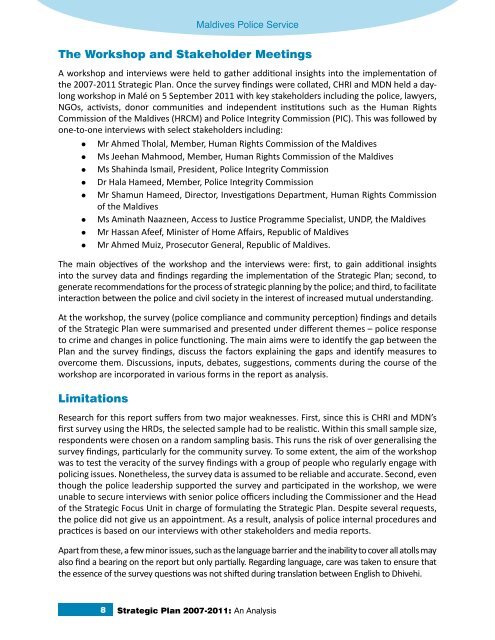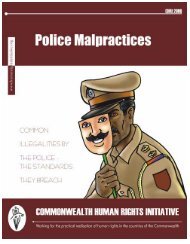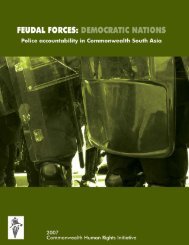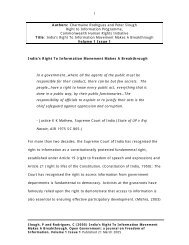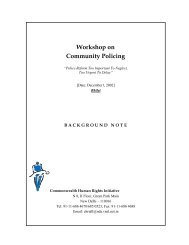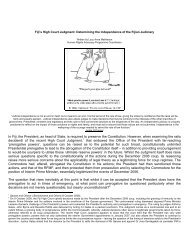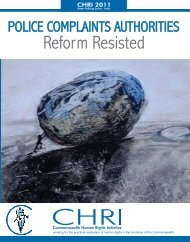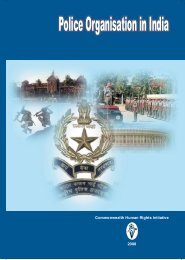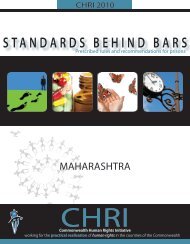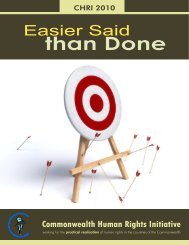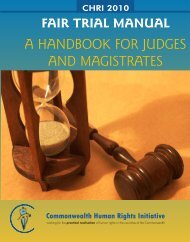Implementation of the Maldives Police Service Strategic Plan
Implementation of the Maldives Police Service Strategic Plan
Implementation of the Maldives Police Service Strategic Plan
You also want an ePaper? Increase the reach of your titles
YUMPU automatically turns print PDFs into web optimized ePapers that Google loves.
<strong>Maldives</strong> <strong>Police</strong> <strong>Service</strong>The Workshop and Stakeholder MeetingsA workshop and interviews were held to ga<strong>the</strong>r additional insights into <strong>the</strong> implementation <strong>of</strong><strong>the</strong> 2007-2011 <strong>Strategic</strong> <strong>Plan</strong>. Once <strong>the</strong> survey findings were collated, CHRI and MDN held a daylongworkshop in Malé on 5 September 2011 with key stakeholders including <strong>the</strong> police, lawyers,NGOs, activists, donor communities and independent institutions such as <strong>the</strong> Human RightsCommission <strong>of</strong> <strong>the</strong> <strong>Maldives</strong> (HRCM) and <strong>Police</strong> Integrity Commission (PIC). This was followed byone-to-one interviews with select stakeholders including:•z Mr Ahmed Tholal, Member, Human Rights Commission <strong>of</strong> <strong>the</strong> <strong>Maldives</strong>•z Ms Jeehan Mahmood, Member, Human Rights Commission <strong>of</strong> <strong>the</strong> <strong>Maldives</strong>•z Ms Shahinda Ismail, President, <strong>Police</strong> Integrity Commission•z Dr Hala Hameed, Member, <strong>Police</strong> Integrity Commission•z Mr Shamun Hameed, Director, Investigations Department, Human Rights Commission<strong>of</strong> <strong>the</strong> <strong>Maldives</strong>•z Ms Aminath Naazneen, Access to Justice Programme Specialist, UNDP, <strong>the</strong> <strong>Maldives</strong>•z Mr Hassan Afeef, Minister <strong>of</strong> Home Affairs, Republic <strong>of</strong> <strong>Maldives</strong>•z Mr Ahmed Muiz, Prosecutor General, Republic <strong>of</strong> <strong>Maldives</strong>.The main objectives <strong>of</strong> <strong>the</strong> workshop and <strong>the</strong> interviews were: first, to gain additional insightsinto <strong>the</strong> survey data and findings regarding <strong>the</strong> implementation <strong>of</strong> <strong>the</strong> <strong>Strategic</strong> <strong>Plan</strong>; second, togenerate recommendations for <strong>the</strong> process <strong>of</strong> strategic planning by <strong>the</strong> police; and third, to facilitateinteraction between <strong>the</strong> police and civil society in <strong>the</strong> interest <strong>of</strong> increased mutual understanding.At <strong>the</strong> workshop, <strong>the</strong> survey (police compliance and community perception) findings and details<strong>of</strong> <strong>the</strong> <strong>Strategic</strong> <strong>Plan</strong> were summarised and presented under different <strong>the</strong>mes – police responseto crime and changes in police functioning. The main aims were to identify <strong>the</strong> gap between <strong>the</strong><strong>Plan</strong> and <strong>the</strong> survey findings, discuss <strong>the</strong> factors explaining <strong>the</strong> gaps and identify measures toovercome <strong>the</strong>m. Discussions, inputs, debates, suggestions, comments during <strong>the</strong> course <strong>of</strong> <strong>the</strong>workshop are incorporated in various forms in <strong>the</strong> report as analysis.LimitationsResearch for this report suffers from two major weaknesses. First, since this is CHRI and MDN’sfirst survey using <strong>the</strong> HRDs, <strong>the</strong> selected sample had to be realistic. Within this small sample size,respondents were chosen on a random sampling basis. This runs <strong>the</strong> risk <strong>of</strong> over generalising <strong>the</strong>survey findings, particularly for <strong>the</strong> community survey. To some extent, <strong>the</strong> aim <strong>of</strong> <strong>the</strong> workshopwas to test <strong>the</strong> veracity <strong>of</strong> <strong>the</strong> survey findings with a group <strong>of</strong> people who regularly engage withpolicing issues. None<strong>the</strong>less, <strong>the</strong> survey data is assumed to be reliable and accurate. Second, eventhough <strong>the</strong> police leadership supported <strong>the</strong> survey and participated in <strong>the</strong> workshop, we wereunable to secure interviews with senior police <strong>of</strong>ficers including <strong>the</strong> Commissioner and <strong>the</strong> Head<strong>of</strong> <strong>the</strong> <strong>Strategic</strong> Focus Unit in charge <strong>of</strong> formulating <strong>the</strong> <strong>Strategic</strong> <strong>Plan</strong>. Despite several requests,<strong>the</strong> police did not give us an appointment. As a result, analysis <strong>of</strong> police internal procedures andpractices is based on our interviews with o<strong>the</strong>r stakeholders and media reports.Apart from <strong>the</strong>se, a few minor issues, such as <strong>the</strong> language barrier and <strong>the</strong> inability to cover all atolls mayalso find a bearing on <strong>the</strong> report but only partially. Regarding language, care was taken to ensure that<strong>the</strong> essence <strong>of</strong> <strong>the</strong> survey questions was not shifted during translation between English to Dhivehi.8<strong>Strategic</strong> <strong>Plan</strong> 2007-2011: An Analysis


